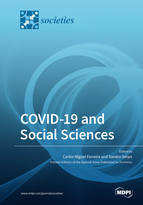COVID-19 and Social Sciences
A special issue of Societies (ISSN 2075-4698).
Deadline for manuscript submissions: closed (31 October 2020) | Viewed by 100215
Special Issue Editors
2. Estoril Higher Institute for Tourism and Hotel Studies, 1069-061 Lisbon, Portugal
Interests: social sciences; arts and humanities
Special Issues, Collections and Topics in MDPI journals
Interests: sociology; teaching sociology; sociology of education; organisations; organisational culture; research; scientific communication; psycho-sociology of educational organisations; digital society; digital literacy and society 5.0
Special Issues, Collections and Topics in MDPI journals
Special Issue Information
Dear Colleagues,
The COVID-19 pandemic is generating a global crisis with high numbers of infected patients and dead. Most countries have imposed a set of prevention procedures and devices based on isolation and social distancing and prohibition of social accumulations that have led simultaneously to the temporary closure of several economic and social institutions and enormous pressure on health systems. These measures have a profound impact on everyday life, the future consequences of which are not yet certain. This is a dynamic situation, with variations according to the different geographical, economic, societal, and cultural contexts affected.
A significant number of epidemics are characterized by a mode of interhuman transmission. For such an epidemic to occur, social interactions between individuals and groups of individuals must develop. The more these interactions are numerous, regular, and rapid, the greater the risk that an epidemic will be triggered and spread on a large scale. These interactions on a global scale shape a pandemic. The world space is a network of large metropolises connected. Epidemics can be considered paradigms of interdependence, expressing the “public evil” that strikes all societies, dominant and dominated.
In several discursive records, epidemic, contagion, and contamination are inseparable notions. The phenomenon these notions describe is always relational, but the role attributed to the reports (elements or individuals placed in relation) may be different. The notion of contagion configures the normative justifications, developed by institutions to formulate, and implement coercive measures, namely, excommunication or quarantine. Naming contagion allows the naturalization of a threat, which is an uncontrolled proliferation of an evil or disease places in a particular community, justifying the adoption of measures to manage that threat.
This whole context has profound implications that raise questions for which the contribution of the Social Sciences does not seem to be sufficiently mobilized (research in SCILIT, virtual social networks, and other databases).
In this Special Issue, we welcome manuscripts of various types, such as empirical research articles (whatever the methodology used), literature reviews, reasoned comments, and justified argumentative essays, which contribute to advancing our understanding of the heuristic capacity of Social Sciences as a fundamental tool in the analysis of cognitive assessments and collective behaviors developed in the pandemic caused by COVID-19 and the implications of the exponential increase of social interactions and spatial, economic, and societal dynamics, at various scales, in the post-pandemic future.
The contributions of the Social Sciences are decisive in shaping the collective management of this and future epidemics and pandemics. Collective management of disease and health involves society in the interpretation and mobilization of institutions and standards that serve to tackle epidemic diseases in less differentiated societies and endemic and epidemic diseases in modern societies, but also contributes to the preservation of health and to the organization of the “governance of life” around shared values, and also competing references and even conflicting standards.
Prof. Carlos Miguel Ferreira
Dr. Sandro Serpa
Guest Editors
Manuscript Submission Information
Manuscripts should be submitted online at www.mdpi.com by registering and logging in to this website. Once you are registered, click here to go to the submission form. Manuscripts can be submitted until the deadline. All submissions that pass pre-check are peer-reviewed. Accepted papers will be published continuously in the journal (as soon as accepted) and will be listed together on the special issue website. Research articles, review articles as well as conceptual papers are invited. For planned papers, a title and short abstract (about 100 words) can be sent to the Editorial Office for announcement on this website.
Submitted manuscripts should not have been published previously, nor be under consideration for publication elsewhere (except conference proceedings papers). All manuscripts are thoroughly refereed through a double-blind peer-review process. A guide for authors and other relevant information for submission of manuscripts is available on the Instructions for Authors page. Societies is an international peer-reviewed open access monthly journal published by MDPI.
Please visit the Instructions for Authors page before submitting a manuscript. The Article Processing Charge (APC) for publication in this open access journal is 1400 CHF (Swiss Francs). Submitted papers should be well formatted and use good English. Authors may use MDPI's English editing service prior to publication or during author revisions.
Keywords
- COVID-19
- Corona Virus
- Sociology
- Social Sciences
- Social distancing
- Education
- Heuristic capacity







